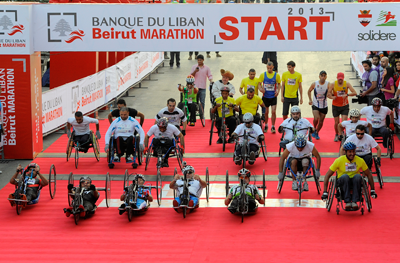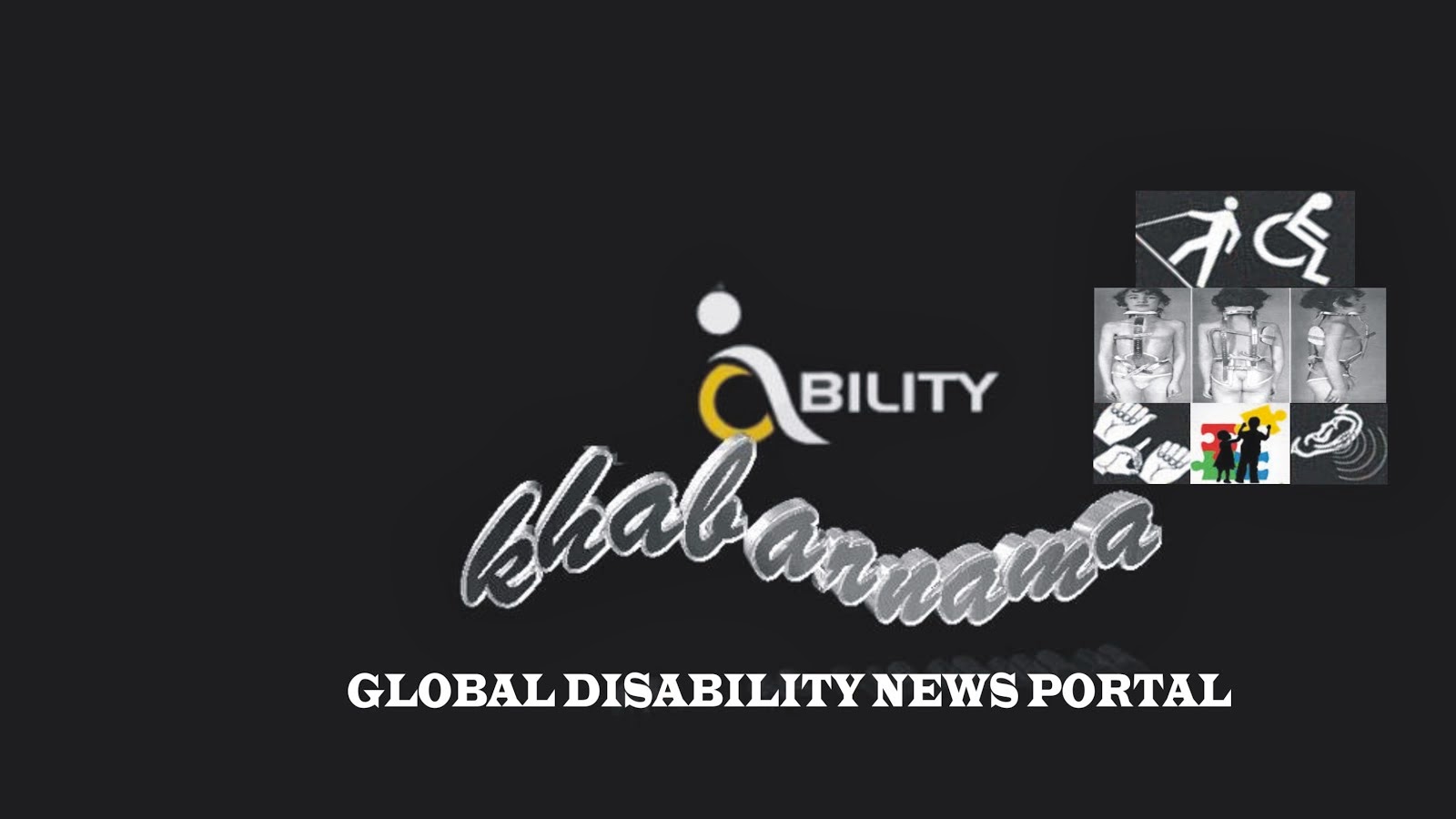“Until Arab society is fully convinced that a disabled person has human rights and can be an effective member in society, I doubt that we will ever reach a point where we can confidently say that we have embraced disabled persons and accepted them as peers.” Those few words uttered by Father Badih el-Hage, General Director of Beit Chabab hospital for the disabled in Lebanon, sum up the situation of the vast majority of disabled people in the Arab world.
 The difficulties for organizations like ours are equal in magnitude, as we are left alone to face the heavy financial implications related to the provision of care for the disabled, with poor, sometimes non-existent support from governments,” El-Hage said.
The difficulties for organizations like ours are equal in magnitude, as we are left alone to face the heavy financial implications related to the provision of care for the disabled, with poor, sometimes non-existent support from governments,” El-Hage said.
“Lack of financial resources means fewer staff, and at the same time there are an increasing number of people with disabilities in Lebanon and the region,” he said, “so I leave it up to you to figure out the consequences.”
El-Hage was one of the key speakers at a seminar, in Lebanon, on persons with disabilities jointly organized by the UN Human Rights Regional Office for the Middle East and North Africa and the Holy Spirit University of Kaslik to promote the ratification of the Convention on the Rights of Persons with Disabilities (CRPD) and its Optional Protocol.
Most Arab countries have ratified the CPRD, however Nawwaf Kabbara, president of the Arab Organization of Persons with disabilities says ratification is only the beginning: “It means nothing practically, if the rights of disabled people are not enshrined within the national legislation of each and every country of the region.”
A wheelchair user himself, Kabbara described a recent journey to New York, where amenities required for a person with a physical impairment were provided.
“Then I come back here, to this part of the world, to the nightmarish obstacles for anyone attempting to get around in a wheelchair in Arab cities,” he said.
“Invisible, that’s what we are. People here forget that we exist and that we have special needs. Whatever their disability, whether it be a physical impairment, blindness, a mental disability, or anything else, people with disabilities are often invisible to the rest of society,” Kabbara said.
Maria Soledad Cisternas Reyes, chairperson of the Committee on the Rights of Persons with Disabilities (CPRD), said that throughout history, people with disabilities have been considered an inferior group in society, adding that around 80 percent of people with disabilities live in developing countries and that among the poorest people in the world, 20 per cent suffer from disabilities.
Participating as a keynote speaker at the seminar, Cisternas said, “ratifying the convention is only the first step towards a full, equal and effective participation and inclusion of the persons with disabilities in society.”
“The convention itself is two-dimensional: first removing the barriers, then creating conditions for the full enjoyment of rights by people with disabilities,” she said.
“It is the full responsibility of States, of society as a whole and also of people with disabilities themselves to remove the barriers that prevent the accession to their rights and development,” Cisternas said.
Panelist Amer Makarem, who chairs “Inclusion Network,” a civil society organization in Lebanon, said that there is a failure to raise public awareness about the rights and potential of persons with disabilities in the Arab world.
“There are also issues when it comes to passing disabled-friendly legislation, gathering and using information and statistics on disability, and supporting organizations for disabled people. Finally, there is a distinct lack of an effort to create an accessible physical environment for disabled people,” he said.
Abdel Salam Sidahmed, Regional Representative for the Middle East and North Africa of the UN Human Rights office urged Arab states to ensure disabled people are given every opportunity to become active members of society.
The roundtable discussion was organized in June at the Holy Spirit University of Kaslik, in Lebanon. Government representatives, academics, members of civil society as well as UN delegates all participated at the event.
Source : UN Human Rights : OHCHR ; 22nd August 2014
 The difficulties for organizations like ours are equal in magnitude, as we are left alone to face the heavy financial implications related to the provision of care for the disabled, with poor, sometimes non-existent support from governments,” El-Hage said.
The difficulties for organizations like ours are equal in magnitude, as we are left alone to face the heavy financial implications related to the provision of care for the disabled, with poor, sometimes non-existent support from governments,” El-Hage said.“Lack of financial resources means fewer staff, and at the same time there are an increasing number of people with disabilities in Lebanon and the region,” he said, “so I leave it up to you to figure out the consequences.”
El-Hage was one of the key speakers at a seminar, in Lebanon, on persons with disabilities jointly organized by the UN Human Rights Regional Office for the Middle East and North Africa and the Holy Spirit University of Kaslik to promote the ratification of the Convention on the Rights of Persons with Disabilities (CRPD) and its Optional Protocol.
Most Arab countries have ratified the CPRD, however Nawwaf Kabbara, president of the Arab Organization of Persons with disabilities says ratification is only the beginning: “It means nothing practically, if the rights of disabled people are not enshrined within the national legislation of each and every country of the region.”
A wheelchair user himself, Kabbara described a recent journey to New York, where amenities required for a person with a physical impairment were provided.
“Then I come back here, to this part of the world, to the nightmarish obstacles for anyone attempting to get around in a wheelchair in Arab cities,” he said.
“Invisible, that’s what we are. People here forget that we exist and that we have special needs. Whatever their disability, whether it be a physical impairment, blindness, a mental disability, or anything else, people with disabilities are often invisible to the rest of society,” Kabbara said.
Maria Soledad Cisternas Reyes, chairperson of the Committee on the Rights of Persons with Disabilities (CPRD), said that throughout history, people with disabilities have been considered an inferior group in society, adding that around 80 percent of people with disabilities live in developing countries and that among the poorest people in the world, 20 per cent suffer from disabilities.
Participating as a keynote speaker at the seminar, Cisternas said, “ratifying the convention is only the first step towards a full, equal and effective participation and inclusion of the persons with disabilities in society.”
“The convention itself is two-dimensional: first removing the barriers, then creating conditions for the full enjoyment of rights by people with disabilities,” she said.
“It is the full responsibility of States, of society as a whole and also of people with disabilities themselves to remove the barriers that prevent the accession to their rights and development,” Cisternas said.
Panelist Amer Makarem, who chairs “Inclusion Network,” a civil society organization in Lebanon, said that there is a failure to raise public awareness about the rights and potential of persons with disabilities in the Arab world.
“There are also issues when it comes to passing disabled-friendly legislation, gathering and using information and statistics on disability, and supporting organizations for disabled people. Finally, there is a distinct lack of an effort to create an accessible physical environment for disabled people,” he said.
Abdel Salam Sidahmed, Regional Representative for the Middle East and North Africa of the UN Human Rights office urged Arab states to ensure disabled people are given every opportunity to become active members of society.
The roundtable discussion was organized in June at the Holy Spirit University of Kaslik, in Lebanon. Government representatives, academics, members of civil society as well as UN delegates all participated at the event.
Source : UN Human Rights : OHCHR ; 22nd August 2014

No comments:
Post a Comment